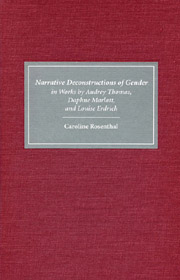Book contents
- Frontmatter
- Contents
- Dedication
- Preface and Acknowledgments
- Abbreviations
- Introduction
- 1 Framing Theories
- 2 “Alice Hoyle: 1,000 Interlocking Pieces”: Identity Deconstructions in Audrey Thomas's Intertidal Life
- 3 “You Can't Even Imagine?”: Monstrous Possibilities of Female Identity in Daphne Marlatt's Ana Historic
- 4 “Her Laugh an Ace”: Narrative Tricksterism in Louise Erdrich's Tetralogy
- Conclusion
- Works Consulted
- Index
1 - Framing Theories
Published online by Cambridge University Press: 05 February 2013
- Frontmatter
- Contents
- Dedication
- Preface and Acknowledgments
- Abbreviations
- Introduction
- 1 Framing Theories
- 2 “Alice Hoyle: 1,000 Interlocking Pieces”: Identity Deconstructions in Audrey Thomas's Intertidal Life
- 3 “You Can't Even Imagine?”: Monstrous Possibilities of Female Identity in Daphne Marlatt's Ana Historic
- 4 “Her Laugh an Ace”: Narrative Tricksterism in Louise Erdrich's Tetralogy
- Conclusion
- Works Consulted
- Index
Summary
Identity
Identity as a concept is fully as elusive as is everyone's sense of his own personal identity.
Anselm L. Strauss, Mirrors and Masks: The Search for IdentityIdentity is an all-pervasive and fundamental aspect of human life, and yet identity as a concept is one of the most hotly debated — contested and defended — concepts of our time. The term identity has its roots in developmental psychology and has only been the subject of critical debates since modernism. The notion of identity as a psycho-social entity only dates back about 100 years to the psychology of William James who differentiated an outer perspective, the “social self” (me) as the self recognized by others, from an inner perspective, the “continuous, inner self” (I) that denoted the self as experienced by the individual. The term identity gains significance in Erikson's psychoanalytical I-psychology. Erikson defines “psychological identity” as being at once objective and subjective, individual, and social. For Erikson, psychological identity is formed through crises, primarily during adolescence. A person has achieved an identity when s/he has successfully synthesized various identifications during adolescence with the hierarchical roles society offers to the individual. Although Erikson concedes that adults also suffer from crises after losses, or other major changes in their lives, these are minor compared to the crises during adolescence because the individual has already achieved a fair degree of continuity and coherence.
Discussions since have circled around the question whether identity, or more precisely the agency of the subject, is dependent on the parameters of continuity and coherence.
- Type
- Chapter
- Information
- Narrative Deconstructions of Gender in Works by Audrey Thomas, Daphne Marlatt, and Louise Erdrich , pp. 7 - 28Publisher: Boydell & BrewerPrint publication year: 2003



